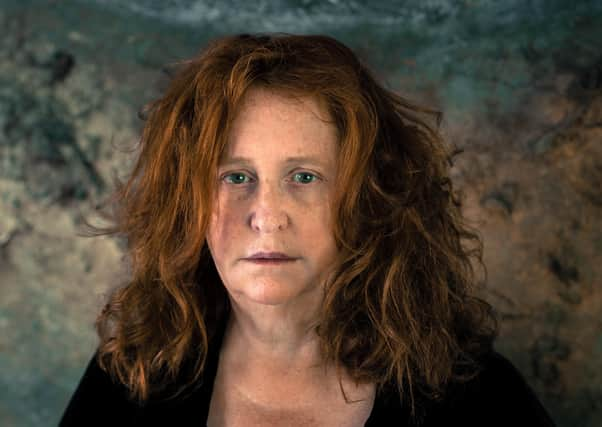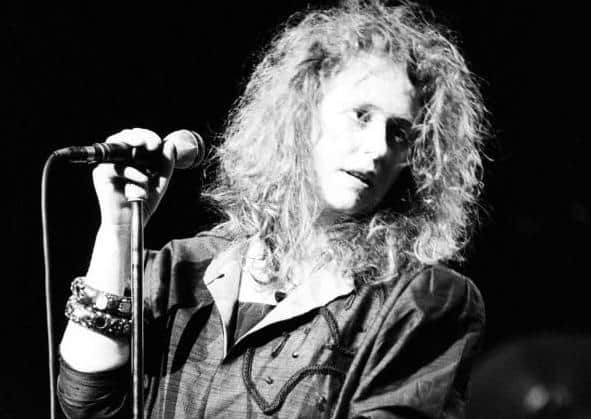MARY COUGHLAN: ‘Music has always been my salvation and my redemption’


Mary Coughlan has every right to sing the blues. In fact, move over Billie Holiday. The Guardian describe her as Ireland’s answer to Tom Waits, and indeed she has that raspy, been-through-the-mill-and-then-some survivor’s true grit, so that when she sings of heartache, grief, loss, emotional pain, you know she has intimate knowledge of what she sings. There is an authenticity in her vocal expression that is undeniable, beguiling and hard won.
Mary, 65, grew up in Galway, the daughter of a soldier father from Co Donegal, and endured an erratic youth that entailed sexual abuse, physical beatings, addiction and a mother who retreated into herself.
Advertisement
Hide AdAdvertisement
Hide AdAs a teen she remembers: “I would climb out a window and go to a gig even though I knew I was going to get killed once I got home. I went to the Aran Islands to see Donovan...I went to see Rory Gallagher and I knew I was going to get clattered when I got back.” At the Ennistymon Festival she memorably sang on the street before absconding with an American accordion player with whom she went to live in a hippie commune in Gort she found to be full of British wealthy parents with lots of children and really ornately painted old school gypsy caravans, horses and developed a propensity to smoke weed.


She began drinking and taking drugs aged 15, spending time in a mental hospital before working as a nude artist’s model in Limerick and then leaving Ireland to live in a squat in London in the 1970s where she dropped acid, read Spare Rib Magazine, RD Laing and other works on anti-psychiatry and Aldous Huxley’s Doors of Perception and Carlos Castaneda, dissecting lines of books for hours and hours, and was well into macrobiotics and veganism several decades before Gwyneth Paltrow, and began to be exposed to different kinds of music, she saw Elton John play and enjoyed freedoms she had never hitherto experienced. (Although her love of melody began much earlier: “My grandmother bought me a transistor radio when I was about 13 and I used to listen to Radio Luxembourg at night” and Van Morrison was one of the first artists she loved with ardour, “Way back then he was God, as far as were concerned”). Music, says Coughlan, has always been her “life, source of escape and redemption. Music took me away from all my misery”. Indeed it has allowed her to transcend the worst that life has thrown at her, and she is a passionate advocate of progressive politics in an Ireland she very much sees as only just coming out from under the skirts of the Catholic Church, its culture of repression, and female disempowerment under a patriarchy that has disgracefully upheld such lengthy obstructions to reproductive rights (the eighth amendment was only repealed in 2018).“Power, religion and control have a lot to answer for,” she states firmly.
Mary married Fintan Coughlan and had three children by the age of 26, but it wasn’t until 1984 when she moved back to her hometown of Galway that she began to perform in public after being noticed and encouraged by Dutch musician and producer Erike Visse, who would become her long-time mentor and collaborator.
“I got knocked down when I was pregnant. I was 12 weeks in hospital with a broken pelvis. And I was six months pregnant. And Erik used to come down every day with a guitar to play tunes. He wrote a song for my daughter Aoife, who’s 45 now, and it was number one in the classical chart in Holland. He became really well known, travelled the whole world and then came back to Galway and said, ‘You have to do this’.”
Advertisement
Hide AdAdvertisement
Hide AdAnd so, she did, rising to the heights of fame with her 1985 debut album Tired and Emotional, followed by Under the Influence in 1987.
The next year she made her acting debut in Neil Jordan’s High Spirits.
She still remembers when she first hit the big time: “It was very strange. One night I was in my dressing room in London and Nick Cave and Shane McGowan and Elvis Costello were all there and I just put it down to the fact that they’re all party animals and so am I. I didn’t ever take it that they thought I was any good [as a singer}. I never believed that. I just couldn’t get my head around it.”
Though she has overcome her alcoholism and addictive traits (cocaine was another well-documented habit when she discovered her second husband Frank Bonadio had been having an affair with the au pair before going on to have a child with Sinead O’Connor) as well as the difficult legacy of sexual and physical abuse, much of which she addressed in her 2009 biography Bloody Mary and in her 2018 unique play Woman Undone, she is still grateful for the catharsis therapy offered in helping her acquire the peace she now enjoys.
Advertisement
Hide AdAdvertisement
Hide Ad“But music has always been my true salvation,” she affirms.
‘I was hospitalised 32 times for alcohol poisoning’
For a time Coughlan was deeply ashamed of her struggle with alcoholism as a mother who would be regularly picked up by the guards and ended up in hospital 32 times in a period of two-and-a-half years for alcohol poisoning.
She had a Damascene moment at a centre for addiction treatment when her therapist told her to stop beating herself up and ‘get down off the cross’. Reading this in her autobiography the artist Constance Short did a painting of her - an abstract depiction of a naked woman on a cross doing a high kick. “A female Jesus kicking out,” laughs Coughlan at the memory.
She recalls that she began to make peace with her parents, and the father who routinely beat her, when she stopped drinking and “stopped blaming them for the way I was”. Mary is aware that her openness about addiction and abuse has helped others. “People wrote to me after Bloody Mary, thousands, about their situations. An awful lot of people got the courage to talk about it.”
Advertisement
Hide AdAdvertisement
Hide Ad‘I survived lockdown drawing flowers and playing online gigs in the garden’
In June 2000, Coughlan took another turn in her career when she presented a series of multimedia shows in Dublin and London celebrating Billie Holiday, a singer whose life has obvious parallels to Coughlan’s and who she regards with affection as this “incredible, fragile, broken woman and you can hear all of that in her voice.”
Material from these shows was collected on Mary Coughlan Sings Billie Holiday. In April 2001 Long Honeymoon was released, and in 2002 Red Blues. The House of Ill Repute was released in 2008.
Last year, Mary received a lifetime achievement award from the Mayor of Galway in recognition of her impact on the cultural life of the city.
Advertisement
Hide AdAdvertisement
Hide AdHer latest album, Life Stories, released in September 2020, comes with personal drawings of flowers enclosed, like she used to do “at the bottom of essays in school”. Not that she thinks of herself as any kind of great visual artist, she just likes “doodling and adding that personal touch to all the new CDs I post out regularly now to fans each time I get an order. I find it calming, but I’m no Pablo Picasso.”
In Life Stories she explores themes of heartache, family strife and the ways in which abuse reverberates through generations. Some of the songs on the album were written for her children, perhaps to help them better understand the life lessons her heavy freight of intense experience has taught her on the path to greater wisdom and self-knowledge.
Mary had planned a year’s worth of lucrative international gigs to promote it, including playing Glastonbury, all of which had to be shelved because of the wretched Covid pandemic.
Her lockdown survival strategy has involved yoga, walking, singing and doing online gigs from her garden with the lads who play in her band. The latter were a big success and she was able to donate proceeds to charities she is passionate about including her local women’s refuge, as well as homeless and addiction services.
Advertisement
Hide AdAdvertisement
Hide AdAs we speak she is in the middle of ironing her outfit for several gigs at local care homes in Wicklow, and she is thrilled at the prospect not only of sharing the joy of live music, but also “to actually have a live captive audience after so long away from performing in front of people.”
‘I have greater empathy with others who have similarly suffered’
Coughlan does feel that her own turbulent odyssey has given her the necessary understanding to sing the blues with conviction, and granted her “I suppose a greater sense of empathy, because when I meet people I tend to get a sense if they have been through difficulty in their lives whether they choose to confide in me about that or not.
“People who sympathise with my songs, they tend to have some experience of personal struggle.”
Advertisement
Hide AdAdvertisement
Hide AdCoughlan has now been sober for over 28 years - a herculean feat given the scale of her previous addiction problems which she overtly connects with her turbulent upbringing and experiences of sexual and physical abuse as well as her own struggles with mental illness, and these days home is a house with a spectacular view of the Wicklow mountains, tucked away in the wilderness where she can be creative, free and finds peace dropping slow.
Here she lives in what sounds like a glorious sort of rural idyll with her partner of two decades Jon Kelly, a Kiwi lighting specialist who spends half his time on the other side of the world, (this suits her just fine and she finds their time apart enriches the time they do spend together; incidentally she has previously toured such far-flung locales as New Zealand, as well as Holland, Iceland, all over in her crisscrossing the globe singing her songs of woe and wonder).
Her daughter Clare from her second marriage to Frank Bonadio (the one who ran off with Sinead O’Connor) now lives in a studio at the end of the garden with her partner and child, and three cats, a dog, somewhere in the region of 30 hens, several beehives in order to have a relentless supply of honey, a horse and a Shetland pony.
It sounds hectic, but Mary confides that her daughter and partner do most of the work in looking after the near-zoo of animals. Mary concentrates on her music and at night falls asleep listening to the radio - the sound of other voices soothes her, quiets the unquiet mind.
Advertisement
Hide AdAdvertisement
Hide AdBut by her own admission, at 65 she is markedly calmer nowadays as a consequence of the work she’s done on herself, more inclined, she says, to let things slide off her. “They say in shamanism, that the rescuer, the victim and the healer, they’re all the same thing. To me, that’s a very inspiring and interesting idea.”
Life Stories can be bought directly at marycoughlanmusic.com. Mary Coughlan and her band will play at the Crumlin Road Gaol, Belfast Friday July 23 and the Stormont Hotel as part of the EastSide Arts Festival on August 13. Tickets available from Ticketsource.
Comment Guidelines
National World encourages reader discussion on our stories. User feedback, insights and back-and-forth exchanges add a rich layer of context to reporting. Please review our Community Guidelines before commenting.